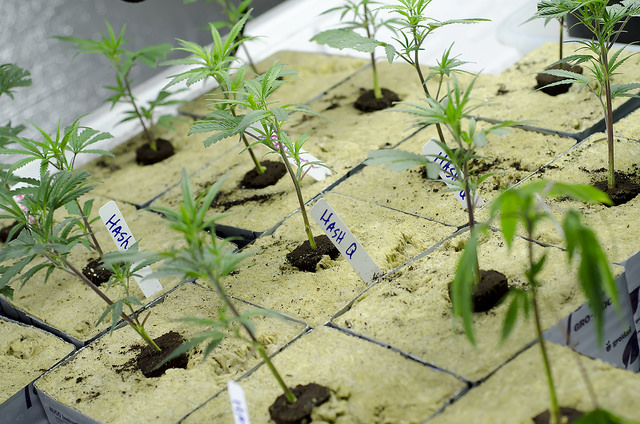Legal recreational weed in Illinois has long seemed a pipe dream for marijuana advocates. While public and political opinion over the years has shifted in favor of recreational weed use for adults over 21, Illinois hasn’t been able to muster more than a highly restrictive medical marijuana law.
Despite the state’s track record on the issue, Cook County Commissioner John Fritchey thinks the day of recreational weed will come sooner than some might think.
“I think it would make sense to do this next year. The public support is clearly there. And [the state] needs to bring in that tax revenue sooner than later,” Fritchey tells Chicago. “There’s no reason to put it off. It’s way past time.”
Fritchey recently stated that he's "confident" the Cook County board will next month vote to place a non-binding advisory referendum about legalizing recreational weed on the ballot for the March primaries. He expects that referendum, which would not directly affect the law, would draw wide support from Cook County voters.
“Cook County makes up approximately 40 percent of the population of Illinois,” says Fritchey, himself a former state lawmaker. “We’ll have good timing to let the legislature know how almost half of of the state feels about this.”
Twin recreational weed bills were introduced in Springfield this spring, but at the time, political watchers said there was not enough support to pass the legislation yet. Fritchey says he hopes that the Cook County vote would strengthen the resolve of state lawmakers to pass legalization. "I’m very confident if this issue could be settled by the voters, it would happen a lot faster," Fritchey adds.
In recreational weed states like California and Colorado, voters didn't only weigh in, they decided on the law via binding ballot initiatives—a legislative mechanism that's virtually non-existent in Illinois.
Still, advisory referendums like the one Fritchey hopes to pass do have power to shape the debate around controversial issues. Christopher Mooney, a state politics expert at the University of Illinois at Springfield, says a successful advisory referendum is "another arrow in the quiver of [legalization] advocates."
"It can be persuasive if policymakers are a little bit nervous about something,” Mooney says. He characterized the General Assembly as generally "small 'c' conservative."
"We don’t usually gets out in front on policy issues," Mooney says. "We don’t want to be Mississippi, but we don’t want to be California, either. We want to be maybe state number 25 on an issue.”
Rep. Lou Lang of Skokie saw that conservative stance firsthand as the co-sponsor of the state's medical cannabis law. "We have a state where the southern part is closer to Louisville than Chicago; we’re thought of a blue state, but most of the state is pretty darn conservative,” Lang says.
Fritchey says it would be harder to pass a legalization bill during an election year—“not impossible, but tougher”—but he also notes that a lot of Democratic lawmakers are amenable to legalization. Fritchey predicts legalization will become an issue in the upcoming gubernatorial election, as well. (Democratic gubernatorial candidates J.B. Pritzker and state Sen. Daniel Biss support legalization, while incumbent Gov. Bruce Rauner generally opposes it.)
Lang is unequivocal about the impact of the gubernatorial race. "If we're going to pass a recreational bill for legalization, it’s not going to be under Bruce Rauner," he says.
Paul Armentano, the deputy director for the Illinois chapter of the National Organization for the Reform of Marijuana Laws, a pro-legalization nonprofit, says it’s a good indication when high-profile candidates—like Sen. Bernie Sanders during last year’s presidential primary—make legalization a campaign issue.
“That’s a fairly recent phenomenon and is an indication that politicians are finally starting to get the message that constituents by and large support this,” Armentano tells Chicago.
The caveat, he says, is that public support doesn’t always translate into a shift in political opinion or political willpower. In states like Maine and Massachusetts, lawmakers have taken steps to push back against the voters’ wishes following a vote to legalize.
“Meanwhile, Colorado was the first state to get legal adult use sales up and running, and did so in about a 14-month period of time after voters approved it,” Armentano says. “Nevada had sales up and running in eight months.”
Fritchey admits he’s witnessed the political lack of resolve firsthand, along with marijuana critics who espouse what he calls “echoes of Reefer Madness,” referencing the 1930s anti-marijuana film.
“When I was in the legislature, I had colleagues say, ‘My grandmother uses it on the side to deal with this or the other, but I can’t back this legislation,’” he says. "I don’t think it’s been a legal inability, it’s been a political inability. People look at [decriminalization and legalization] as a political third rail."
But Cook County, like the state itself, is cash-strapped and in desperate search of new revenue. After Cook County President Toni Preckwinkle’s unpopular sweetened beverage tax went down in flames, the county has a $200 million budget hole to plug and possibly hundreds of layoffs on the horizon if it doesn’t.
Colorado and Washington, on the other hand, have been raking in the tax revenue from legal weed sales by the billions with few to no adverse effects on issues like road safety or public health, according to reports.
However Illinois’ path to recreational legalization unfolds—something advocates see as an inevitability—Fritchey says a successful County Board vote that gets the issue on the March ballot will keep discussion about the issue alive.
“The key is to keep inching the ball closer to the goal line,” Fritchey says. “In this case, I have a very sincere desire to let the voters weigh in. That’s how we should run government.”




Comments are closed.